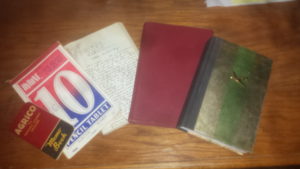
Various types of my journal media over the decades
You’ve just had the worst week of your life, intensifying with each passing day. You have enraged your boss with your continued poor work habits. Your significant other can hardly stand the sight of you anymore. You’ve alienated your best friend with your insensitive remarks and even your dog doesn’t bother to greet you at the door. Worst of all, you’re bitterly disappointed with yourself, knowing vaguely how you got here while you watched it happen…without doing anything about it.
It’s late now. You’re the only one still awake in the house because you can’t sleep. You go to your desk and pull out your journal instead of the flask that you’ve been resorting to lately. There’s an urge to get your feelings down on paper, but there’s a barrier as thick as a briar patch crisscrossed with confusion, conflicting emotions, guilt, self-righteousness and melancholy. It’s downright chilling to take a peek into the swirling maelstrom of the mind. And yet, you know deep within you have to if you’re ever going to sort this all out.

On the edge
So, you find an entry point and you begin writing with something like, “My life is horrible!” You tap into an anger you’re suddenly glad you have. Chronicling all the areas that are troubling you with a dramatic flair feels deliciously satisfying somehow. All the people and uncontrollable factors and animals that have impeded your quest for an ideal life. But then your attention turns to you. Ahhh, the stabbing thrust of responsibility…and with that, the healing begins.
In this scenario is found the therapeutic side of journaling. I say from experience that this is undoubtedly real. It worked for me tremendously when I was in my teens and into my mid-20’s. I used it often then, working through self-loathing and general frustration for which I had no other workable outlet. As I matured and mellowed, the peaks and valleys evened out and I didn’t need the journal for therapy. Well, not so often anyway. There were challenging times in my career and my personal life which made me dig deep within for answers. Analysis through writing helped bring me to those answers that may have remained untapped otherwise. Please realize this wasn’t just putting my misery on the page and feeling relief from the release of emotion. I often made valuable discoveries about myself, resulting in joy and excitement for my future.
Documentation of milestones is another excellent reason for keeping a journal. Noting those memorable moments of your life–graduations, first loves and firsts of any kind, significant losses, turning points–creates a record of a life lived and examined. From an early age, I saw the value in writing out these pivotal scenes so that years later I could come back and gain wisdom from the perspective it would give me to read what I had written. There’s definitely a certain amount of ego required to bother with such self-absorbed activity, but this last year I wrote a memoir. I found my journals and old letters I’ve saved invaluable. When I had to revisit my viewpoint at a given juncture, my written thoughts and feelings brought considerable understanding to areas that were shrouded in shadowy misconceptions for a long time. As a side note, it’s surprising how often I had lost sight of the details of some incident and actually remembered it incorrectly! I’m so glad I have these old papers to keep me honest.
The moments of epiphany, which we all have from time to time, are my favorite entries in my journal. The lows and the struggles can help us grow. The agonizing processing of these difficult phases make for some interesting writing and are important to our spiritual evolution, but when we poke our heads above those storm clouds, we appreciate the view as well as the rush of exhilaration brought by new understanding. To capture those moments of truth while they are fresh in my mind and beaming from my heart is the quintessence of my journaling life. The irony, I suppose, is that those experiences are imperfect expressions when reduced to mere words. Nonetheless, we must always try. The great poets show us glimpses, at least, of the inexpressible and the sacred. When we look within and see what is truly there behind the pain and suffering, we have the opportunity to perceive in all senses the beauty waiting to be known.
Kahlil Gibran wrote, “Beauty is life when life unveils its holy face. But you are life and you are the veil. Beauty is eternity gazing at itself in the mirror. But you are eternity and you are the mirror.”
By contemplating and reflecting in the medium of the written word, you can bring to full blossom the entire range of life experience.
I must say you have very interesting content here. Your website should go viral.
You need initial boost only. How to get it? Search for; Miftolo’s tools go viral